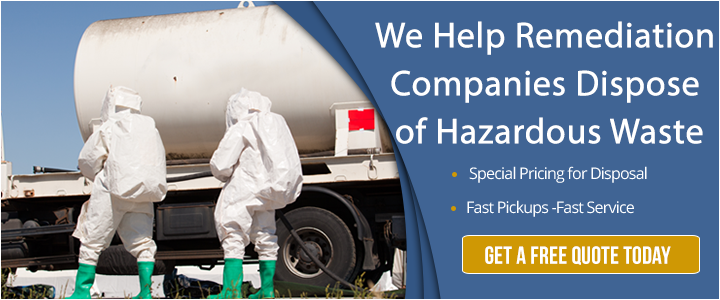In environmental remediation, one misstep can have far-reaching consequences.
Picture this: your remediation company, armed with expertise and dedication, is on the cusp of tackling a daunting project. Yet, lurking beneath the surface lies a challenge of hazardous proportions – the disposal of hazardous waste.
Are you equipped to navigate this hazardous terrain? In an industry where client expectations meet legal obligations, finding the right partner for hazardous waste disposal is critical.
Understanding Client And Legal Expectations
Clients increasingly expect comprehensive solutions that address not only the remediation process itself but also the.png?width=300&height=251&name=Subheading%20(9).png) responsible management and disposal of any hazardous waste generated during the course of remediation activities.
responsible management and disposal of any hazardous waste generated during the course of remediation activities.
This evolving expectation reflects a broader societal awareness of environmental concerns and regulatory requirements surrounding hazardous waste management.
Clients entrust remediation companies not only with the task of remedying environmental issues but also with ensuring that the entire process is conducted in a manner that minimizes harm to human health and the environment. This includes the proper identification, handling, transportation and disposal of hazardous materials in compliance with relevant regulations and legal frameworks.
As a remediation company, it’s critical to recognize and fulfill these expectations by integrating hazardous waste management into your service offerings. Beyond meeting client demands, there are also legal obligations to consider. Failure to comply with hazardous waste regulations can result in significant legal and financial consequences, including fines, penalties and reputational damage.
By proactively addressing both client expectations and legal responsibilities, your remediation company can enhance its credibility, mitigate risks and foster long-term success in the industry.
When You May Need Hazardous Waste Disposal Services
Remediation companies often encounter several scenarios where specialized hazardous waste disposal services become essential. Understanding these scenarios is crucial for ensuring the safe and compliant management of hazardous materials throughout the remediation process.
Here are some common scenarios where remediation companies may require the expertise of hazardous waste disposal services:
- Contaminated Soil Remediation: Remediation projects involving the cleanup of soil contamination, whether due to industrial spills, leaking underground storage tanks or historical contamination, often generate hazardous waste. Hazardous substances like heavy metals, petroleum hydrocarbons and volatile organic compounds (VOCs) may require specialized disposal methods to prevent environmental contamination and safeguard public health.
- Chemical Spills and Releases: Accidental chemical spills and releases can occur during remediation activities, posing immediate risks to workers, nearby communities and the environment.
- Industrial Facility Decommissioning: When decommissioning industrial facilities or obsolete infrastructure, remediation companies often encounter various hazardous materials, including asbestos, lead-based paint, mercury-containing equipment and chemical residues.
- Brownfield Redevelopment: Redevelopment of brownfield sites, which may have been previously used for industrial or commercial purposes, often involves remediation to address soil and groundwater contamination. Hazardous waste disposal services are needed to manage and dispose of contaminated materials safely, allowing for site redevelopment while minimizing environmental risks.
- Environmental Cleanup Projects: Remediation companies engaged in environmental cleanup projects, such as addressing pollution incidents, restoring ecosystems or rehabilitating contaminated properties, may encounter hazardous waste materials requiring specialized handling and disposal. From oil spills to hazardous waste dumps, these projects demand meticulous planning and execution to mitigate environmental impacts effectively.
- Healthcare Facility Decontamination: Remediation of healthcare facilities, laboratories and pharmaceutical manufacturing sites may involve the removal and disposal of hazardous waste materials, including biohazardous waste, pharmaceutical waste and chemical residues. Hazardous waste disposal services are essential for managing these materials in accordance with stringent regulatory requirements and infection control protocols.
In each of these scenarios, remediation companies must prioritize the safe and compliant management of hazardous waste materials to protect human health, safeguard the environment and maintain regulatory compliance. Partnering with specialized hazardous waste disposal services ensures that remediation projects proceed smoothly, mitigating risks and achieving successful outcomes.
5 Benefits Of Partnering With Hazardous Waste Disposal
Partnering with specialized hazardous waste disposal firms offers many advantages for remediation companies like yours, ranging from expanded service offerings to enhanced expertise and regulatory compliance support.
yours, ranging from expanded service offerings to enhanced expertise and regulatory compliance support.
Here are five key benefits of partnering with hazardous waste disposal companies:
- Expanded Service Offerings: Collaborating with hazardous waste disposal companies allows remediation firms to offer comprehensive, end-to-end solutions to their clients. By integrating hazardous waste management into their service portfolio, remediation companies can better meet the diverse needs and expectations of clients seeking holistic remediation solutions.
- Enhanced Expertise: Hazardous waste disposal companies possess specialized knowledge and expertise in handling various types of hazardous materials, contaminants and waste streams. Partnering with these firms provides remediation companies access to invaluable insights, best practices and technical resources that can optimize the efficiency and effectiveness of remediation projects.
- Regulatory Compliance Support: Navigating the complex landscape of environmental regulations and compliance requirements can be challenging for remediation companies. Hazardous waste disposal firms bring an in-depth understanding of regulatory frameworks, ensuring that all hazardous waste management activities adhere to applicable laws and standards. By leveraging the regulatory expertise of their partners, remediation companies can minimize compliance risks and avoid costly penalties.
- Cost-Effectiveness: Collaborating with hazardous waste disposal companies can yield cost savings for remediation firms by streamlining waste management processes, optimizing resource utilization and reducing potential liabilities. Outsourcing hazardous waste disposal tasks to specialized firms also eliminates the need for remediation companies to invest in costly equipment, infrastructure and personnel training.
- Risk Mitigation: Proper management of hazardous waste is critical for mitigating environmental, health and legal risks associated with remediation projects. Partnering with reputable hazardous waste disposal companies helps remediation firms mitigate these risks by ensuring safe and compliant handling, transportation and disposal of hazardous materials. This, in turn, enhances project safety, minimizes liabilities and protects the reputation of remediation companies.
By forging strategic partnerships with specialized firms, remediation companies can strengthen their competitive position, deliver superior value to clients and achieve sustainable growth in the remediation industry.
How To Assess A Disposal Partner
Selecting the right hazardous waste disposal company to partner with is a critical decision for your remediation company, since it directly impacts project success, regulatory compliance and client satisfaction.
Here are essential factors to consider when evaluating potential partners:
- Regulatory Compliance and Certification: Ensure that the hazardous waste disposal company holds all necessary permits, licenses and certifications required by regulatory authorities. Verify compliance with federal, state and local regulations governing hazardous waste management, including the Resource Conservation and Recovery Act (RCRA) in the United States and the Department of Toxic Substances Control in California.
- Expertise and Experience: Assess the hazardous waste disposal company's expertise and track record in handling a diverse range of hazardous materials, contaminants and waste streams. Look for evidence of experience in remediation-related industries and familiarity with industry best practices and technological advancements.
- Comprehensive Service Offerings: Choose a hazardous waste disposal partner that offers comprehensive services tailored to the specific needs of remediation projects. Evaluate the company's capabilities in hazardous waste collection, transportation, treatment, recycling and disposal across various industries and applications.
- Technical Resources and Equipment: Investigate the hazardous waste disposal company's technical resources, equipment and infrastructure to ensure they are capable of handling hazardous materials safely and efficiently. Consider factors such as waste treatment facilities, specialized containers and transportation fleet capabilities.
- Emergency Response Capabilities: Assess the hazardous waste disposal company's readiness to respond promptly and effectively to emergencies, including chemical spills, releases or containment breaches. Evaluate their emergency response protocols, personnel training and availability of resources for rapid mobilization.
- Environmental Stewardship Practices: Look for a hazardous waste disposal partner committed to environmental stewardship and sustainability practices. Consider their efforts to minimize waste generation, promote recycling and reuse, and implement environmentally responsible disposal methods, such as thermal treatment or incineration.
- Customer References and Reputation: Seek feedback from past clients and industry peers to gauge the hazardous waste disposal company's reputation, reliability and customer satisfaction levels. Request references and case studies showcasing successful partnerships and project outcomes.
- Cost-Effectiveness and Value: Compare pricing structures, service fees and contractual terms among potential hazardous waste disposal partners to ensure cost-effectiveness without compromising quality or compliance. Evaluate the overall value proposition, considering factors such as service quality, reliability and added benefits. Never hesitate to request a free quote.
- Communication and Collaboration: Prioritize open communication and collaboration when selecting a hazardous waste disposal partner. Choose a company that values transparency, responsiveness and collaboration in project planning, execution and reporting.
By carefully considering these factors and conducting thorough due diligence, your remediation company can identify the best hazardous waste disposal partner to support your projects effectively. A strategic partnership with a reputable and reliable disposal company contributes to a project’s success while ultimately enhancing the overall reputation and competitiveness of your remediation firm.


Comment